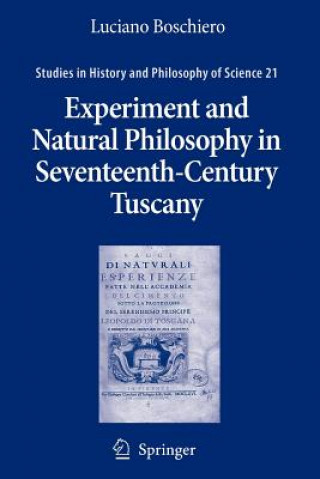
Kod: 01975727
Experiment and Natural Philosophy in Seventeenth-Century Tuscany
Autor Luciano Boschiero
The Accademia del Cimento (1657-1667) was the first institution in Europe purporting to use an experimental method in its scientific inquiries. According to some recent accounts, the Cimento belonged to a new culture of knowledge ... więcej
- Język:
 Angielski
Angielski - Oprawa: Miękka
- Liczba stron: 251
Wydawca: Springer, 2010
- Więcej informacji o książce

276.87 €

Dostępna u dostawcy w małych ilościach
Wysyłamy za 10 - 15 dni
Potrzebujesz więcej egzemplarzy?Jeżeli jesteś zainteresowany zakupem większej ilości egzemplarzy, skontaktuj się z nami, aby sprawdzić ich dostępność.
Dodaj do schowka
Zobacz książki o podobnej tematyce
-

Quiet Strength
17.68 € -13 % -

Aging 2000: Our Health Care Destiny
91.12 € -

On the Street Where You Live
9.09 € -21 % -
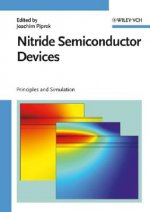
Nitride Semiconductor Devices
262.96 € -
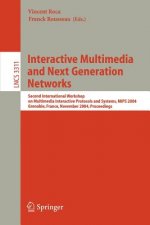
Interactive Multimedia and Next Generation Networks
62.28 € -
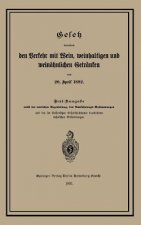
Gesetz Betreffend Den Verkehr Mit Wein, Weinhaltigen Und Weinahnlichen Getranken Vom 20. April 1892
67.80 € -

Manuell belichten mit der Digitalkamera
10.01 € -10 %
Bon podarunkowy: Radość gwarantowana
- Podaruj bon o dowolnej wartości, a my się zajmiemy resztą.
- Bon podarunkowy dotyczy całej naszej oferty.
- Możesz wydrukować elektroniczny bon z e-maila a następnie przekazać go obdarowanemu.
- Ważność bonu wynosi 12 miesięcy od daty wystawienia.
Więcej informacji o Experiment and Natural Philosophy in Seventeenth-Century Tuscany
Za ten zakup dostaniesz 685 punkty
 Opis
Opis
The Accademia del Cimento (1657-1667) was the first institution in Europe purporting to use an experimental method in its scientific inquiries. According to some recent accounts, the Cimento belonged to a new culture of knowledge making that abandoned the practice of constructing theories in favour of a programme that simply accumulated matters of fact , free from theoretical arguments and speculations.§However, while the Cimento, led by Tuscany s Prince Leopoldo de Medici, created a persuasive experimental rhetoric, in actuality the academicians continued to construct experiments and interpret their results on the basis of their theoretical aims and their broader interests in natural philosophy.§This analysis begins by examining the use of experiments, mathematics, and natural philosophy in seventeenth-century Italy. Once these topics are clearly defined, it becomes easier to understand the intellectual interests and motivations of each of the Cimento s members. Case studies regarding the Cimento s work on air-pressure, the vacuum, the freezing process, and the properties and effects of heat and cold, reveal the group s natural philosophical skills, commitments, and agendas. Meanwhile, in an attempt to avoid religious pressure and to maintain an uncontroversial reputation for the academy, Leopoldo censored the academicians from publicly expressing their views on a number of issues.§The purpose of this work is to counter historiographies that search for the origins of modern science within the experimental practices of Europe s first scientific institutions, such as the Cimento. It proposes that we should look beyond the experimental rhetoric found in published works, to find that the Cimento academicians were participants in a culture of natural philosophical theorising that existed throughout Europe.This work counters historiographies that search for the origins of modern science within the experimental practices of Europe s first scientific institutions, such as the Cimento. It proposes that we should look beyond the experimental rhetoric found in published works, to find that the Cimento academicians were participants in a culture of natural philosophical theorising that existed throughout Europe.The Accademia del Cimento (1657-1667) was the first institution in Europe purporting to use an experimental method in its scientific inquiries. According to some recent accounts, the Cimento belonged to a new culture of knowledge making that abandoned the practice of constructing theories in favour of a programme that simply accumulated matters of fact , free from theoretical arguments and speculations. §However, while the Cimento, led by Tuscany s Prince Leopoldo de Medici, created a persuasive experimental rhetoric, in actuality the academicians continued to construct experiments and interpret their results on the basis of their theoretical aims and their broader interests in natural philosophy.§This analysis begins by examining the use of experiments, mathematics, and natural philosophy in seventeenth-century Italy. Once these topics are clearly defined, it becomes easier to understand the intellectual interests and motivations of each of the Cimento s members. Case studies regarding the Cimento s work on air-pressure, the vacuum, the freezing process, and the properties and effects of heat and cold, reveal the group s natural philosophical skills, commitments, and agendas. Meanwhile, in an attempt to avoid religious pressure and to maintain an uncontroversial reputation for the academy, Leopoldo censored the academicians from publicly expressing their views on a number of issues.§The purpose of this work is to counter historiographies that search for the origins of modern science within the experimental practices of Europe s first scientific institutions, such as the Cimento. It proposes that we should look beyond the experimental rhetoric found in published works, to find that the Cimento academicians were participants in a culture of natural philosophical theorising that existed throughout Europe.
 Szczegóły książki
Szczegóły książki
Kategoria Książki po angielsku Humanities Philosophy History of Western philosophy
276.87 €
- Pełny tytuł: Experiment and Natural Philosophy in Seventeenth-Century Tuscany
- Podtytuł: The History of the Accademia del Cimento
- Autor: Luciano Boschiero
- Język:
 Angielski
Angielski - Oprawa: Miękka
- Liczba stron: 251
- EAN: 9789048175819
- ISBN: 904817581X
- ID: 01975727
- Wydawca: Springer
- Waga: 406 g
- Wymiary: 235 × 155 × 14 mm
- Data wydania: 19. November 2010
Ulubione w innej kategorii
-

Meditations
8.89 € -29 % -

The Myth of Sisyphus
8.07 € -

Aphorisms on Love and Hate
3.57 € -24 % -

Myth of Sisyphus
11.14 € -23 % -

Discourses and Selected Writings
10.93 € -24 % -

Simulacra and Simulation
19.01 € -17 % -

At The Existentialist Cafe
12.78 € -1 % -
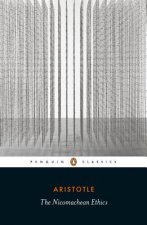
Nicomachean Ethics
11.96 € -17 % -
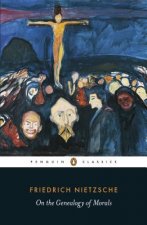
On the Genealogy of Morals
11.14 € -17 % -
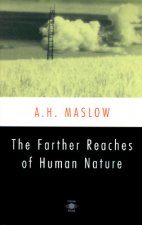
The Farther Reaches of Human Nature
16.36 € -10 % -
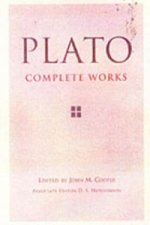
Plato: Complete Works
76.91 € -15 % -
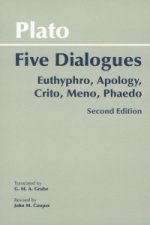
Plato: Five Dialogues
13.59 € -14 % -
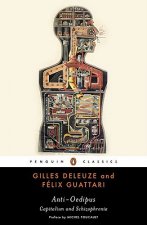
Anti-Oedipus
19.32 € -20 % -
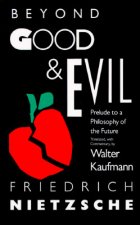
Beyond Good & Evil
12.88 € -21 % -

Thus Spoke Zarathustra
25.66 € -11 % -
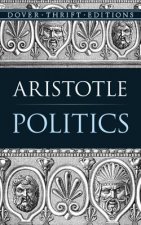
Politics
10.83 € -19 % -

Selected Philosophical Writings
11.55 € -29 % -
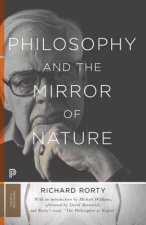
Philosophy and the Mirror of Nature
19.63 € -19 % -
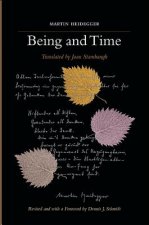
Being and Time
20.65 € -21 % -
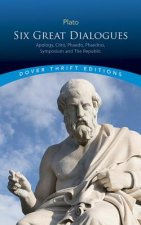
Six Great Dialogues
6.84 € -19 % -
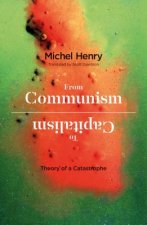
From Communism to Capitalism
70.77 € -

Meditations
20.04 € -21 % -

Why I Am so Clever
3.88 € -18 % -

Letters from a Stoic
12.37 € -15 % -
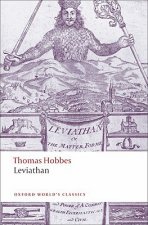
Leviathan
9.50 € -16 % -

Meditations
14.92 € -25 % -

Beyond Good and Evil
9.71 € -33 % -

Existentialism Is a Humanism
8.07 € -28 % -

Either/Or
19.42 € -

The Symposium
9.30 € -25 % -

Think
12.26 € -23 % -

The Trouble With Being Born
11.85 € -27 % -

Ride the Tiger
19.22 € -26 % -

Spell of the Sensuous
17.07 € -12 % -

Nausea
11.14 € -23 % -

Gay Science
12.67 € -22 % -

Nicomachean Ethics
5.62 € -25 % -

Thus Spoke Zarathustra
9.50 € -29 % -

Twilight of the Idols with The Antichrist and Ecce Homo
5.41 € -28 % -

Socrates' Defence
3.47 € -26 % -

Ecce Homo
11.34 € -31 % -

Human, All Too Human & Beyond Good and Evil
5.92 € -21 % -
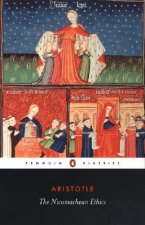
Nicomachean Ethics
12.98 € -18 % -

Works of Love
11.45 € -28 % -

On War
5.51 € -26 % -

Meditations of Marcus Aurelius
8.17 € -13 % -
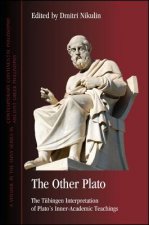
Other Plato
40.80 € -

Republic
11.96 € -17 % -

Phenomenology of Spirit
34.87 €
Osobní odběr Bratislava a 2642 dalších
Copyright ©2008-24 najlacnejsie-knihy.sk Wszelkie prawa zastrzeżonePrywatnieCookies


 Vrácení do měsíce
Vrácení do měsíce Zdarma od 49.99 €
Zdarma od 49.99 € 02/210 210 99 (8-15.30h)
02/210 210 99 (8-15.30h)